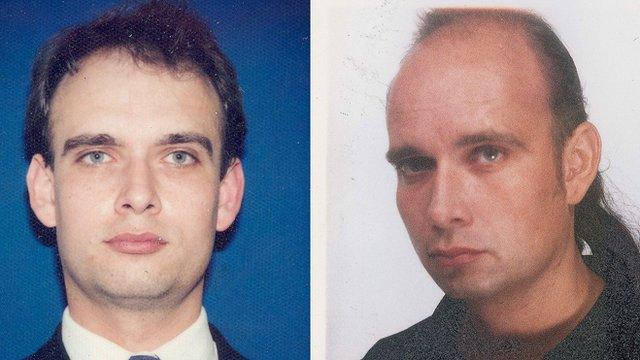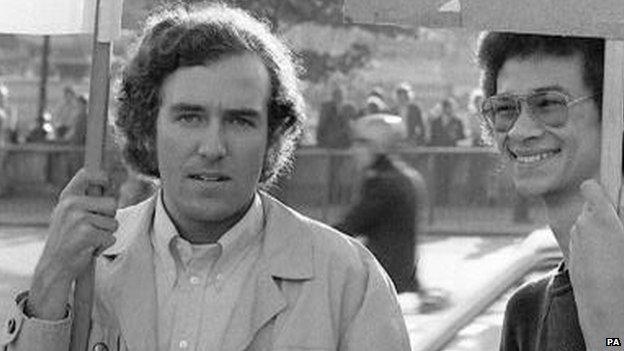MPs 'monitored by Scotland Yard during 1990s'
- Published

Peter Francis: transformed his appearance as he went deep undercover
A former undercover police officer has told BBC News that Scotland Yard kept intelligence files on MPs during the 1990s.
Ex-Special Branch officer Peter Francis says he saw files on 10 Labour MPs which he and others regularly updated.
He says he personally gathered information on three MPs as part of his work infiltrating left-wing groups.
The MPs named, and Labour, have called for a forthcoming public inquiry into undercover policing to be widened.
Mr Francis operated undercover between 1993 and 1997 in the Met's now disbanded Special Demonstration Squad. He was told to embed himself in left-wing groups or causes that were deemed to pose a potential threat to security.
Pink file
He says that during this period he was told to gather intelligence on MPs and their activities if and when they featured in any of his operations.
That information, he says, was added to a special pink file that was available for Special Branch officers to read.
Between 1990 and 2001, he claims to have personally seen records relating to Diane Abbott, the late Tony Benn, Jeremy Corbyn, the late Bernie Grant, Peter Hain, Harriet Harman, Ken Livingstone, Joan Ruddock, Dennis Skinner and Jack Straw.
Four of the group became ministers during Mr Francis's time in Special Branch - including Jack Straw who was home secretary after 1997.
"When I was deployed undercover in the Special Demonstration Squad, any MP that I came across, such as on demonstrations, I would report back on them," he said.
Mr Francis says that the files not only contained the MPs' publicly-stated political views - but also intelligence on what was going on behind the scenes in the party or their group. He says some of the information would have been things said in private by the MP, depending on how close each undercover officer had been able to get.
Mr Francis said that when he first saw the files he understood that each had probably been created before the individual was an MP because of their personal involvement in radical causes or protests.
But he added: "When they became MPs these files carried on. It [was] your duty as an SDS officer to report back any intelligence that you come across.

Peter Hain: Monitored in his youth - monitored as an MP?
"I felt that it was OK to report back on MPs," he said. "I used to give myself a pat on the back, thinking 'I have done a good job'. These MPs were spied on and they should know."
"I don't think the police force should be monitoring MPs, full stop. I don't think we have any right to do that at all. It may be justifiable to say that the Security Service should be doing it - but I certainly don't think the police should be doing it."
Scotland Yard has refused to comment on the substance of the claims, but a spokesman said it had not shied away from serious allegations about the SDS. It said that Operation Herne, the internal police investigation into what happened in the unit, remained an ongoing investigation.
"Operation Herne maintains that without speaking to Peter Francis it is simply not possible to fully investigate allegations he makes," said a spokesman. "Operation Herne remains very willing to engage with him."
Mr Francis said that he has refused to speak to Operation Herne because he fears being interviewed under caution as a suspect, rather than a whistleblower. Scotland Yard told the BBC that Operation Herne detectives would be prepared to speak to him as a witness.
He has, however, spoken to Mark Ellison QC who reviewed allegations about the SDS for the Home Secretary Theresa May - prompting her to launch a statutory inquiry. He says he will appear before those hearings.
'Infringes sovereignty'
Peter Hain, who was a leader of the anti-apartheid movement in the late 1960s and 70s and became an MP in 1991, said he now wants full answers from Scotland Yard.
"I was deeply disturbed to find that files were still being kept by the Special Branch while I and others were serving Members of Parliament," he said.
"That is constitutionally an outrage. It infringes the sovereignty of Parliament.
"I want to see the home secretary widen the scope of the inquiry into the SDS to look specifically at the surveillance of MPs and the fact that there were active files on us while we were serving Members of Parliament.
"This should never have happened and it should have been reported and properly authorised - and we don't know whether it was."
Shadow Home Secretary Yvette Cooper echoed the call for the inquiry to be widened in light of what she described as "extremely serious and disturbing allegations".
"While undercover policing remains a crucial tool in combating serious and organised crime it must not be abused," she said.
"There have now been a series of serious allegations about undercover policing - ranging from the treatment of Stephen Lawrence's family to police having long-term inappropriate relationships.
"We called some time ago for much stronger oversight of undercover policing and it is also vital to get to the truth about what has happened."
Mrs May announced earlier this month that Lord Justice Pitchford would lead the inquiry into the SDS allegations - but the precise shape of that inquiry is not yet clear.
A Home Office spokesman said the review by Mark Ellison QC had unearthed "serious historical failings".
"That is why the Home Secretary established a public inquiry to thoroughly investigate undercover policing and the operation of the Special Demonstration Squad.
"Lord Justice Pitchford will consult interested parties to the inquiry over the coming months on setting the terms of reference, with a view to publishing these at the end of July.
"Undercover policing is an essential tactic in the fight against crime but to improve the public's confidence in undercover work we must ensure there is no repeat of these failings in the future."